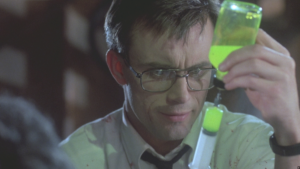“I am living in sin, and I will go to hell because of it.” -Martin Scorsese
Death always wins. One day it’s just you in your room, alone, with a dusty collection of photographs and memories. That’s all a ghost is, a memory: the past reaching out, not alive, but fitfully present. Flashes of this or that center themselves: a chance encounter, a fateful decision, a missed opportunity. Frank Sheeran (Robert De Niro) – who, to hear him tell it over three-and-a-half hours, was the Forrest Gump of the second half of 20th century mob history – has more of these than most, buried under a mountain of regrets.
The film telescopes his life, artfully skipping back and forth between different eras, from Frank’s days of WWII service and teamster truck driving all the way through to his final days in a nursing home, where he now recounts his story. It encompasses 30+ years of perhaps the most colorful period in the history of American organized crime, as Frank becomes involved with Philadelphia boss Russell Bufalino (Joe Pesci) and teamster boss and mob legend Jimmy Hoffa (Al Pacino).
What’s striking is how the film elides any of the pleasures of mob life: the lasting impression is one of drudgery, repetition, the creeping dread of life passing you by. To reinforce the inevitability of death, Scorsese introduces many famous mob figures with the date and cause of their deaths superimposed on the screen: shot in the head, Dec. 1980; killed by a nail bomb; sentenced to 100 years and died in prison. All men die; few of these men will go gently.
Frank seems less to live his life than to allow it to happen to him. He’s a loyal soldier above all, a man of few words and fewer interests. Of the women in his life (his two wives, his four daughters), we know almost nothing. He recalls his life as a series of historical events for which he was present (or adjacent to): a delivery of weapons to be used during the Bay of Pigs invasion; the assassination of Crazy Joe Gallo; Hoffa’s rise and fall, and his battles with the Kennedys and the mob along the way.
The main source of pleasure in Frank’s life is his friendship with Hoffa, to whom he was a close confidant, assistant, bodyguard and (allegedly) hitman. Pacino plays Hoffa with an exhausted bluster that highlights his strengths as a scenery-chewer but never spills over into absurdity. It helps that Hoffa himself was larger-than-life in a way few public figures ever are.
Hoffa’s soul haunts the film. Sheeran’s closeness to Bufalino is professional, circumstantial: he reveres and respects him (Pesci plays him with an uncharacteristic and commanding stillness). He loves Hoffa. The two travel together, bunking in the same room and affectionately squabbling and joking like an old married couple. And Hoffa dotes on Sheeran’s daughter, Peggy, who takes to him in a way she never does her own father (or, for that matter, Bufalino, who frightens her). Sheeran is never more concerned than when attempting to reason Hoffa down from a confrontation with his mob higher-ups, but one of the film’s frightening (and hilarious) observations is the infinite fragility of the male ego; so much of the film consists of men with hair-trigger tempers resorting immediately to violence at the first sign of unease. Scorsese has always been perhaps the foremost chronicler of masculine excess and toxicity; rarely has he made it seem so pointless and pathetic.
Hoffa finds himself in and out of jail, and in and out of favor with his mob co-conspirators, who eventually attempt to strong-arm him away from the union he once ran. It’s Frank who is sent first to offer an olive branch, and then, when that fails, to give him an ultimatum. He, of course, fails to convince Hoffa; Hoffa disappeared in 1975, presumed murdered by the mob, and Sheeran claims to have done it himself. The film centers itself on the weekend Frank allegedly killed Hoffa; its emotional progression builds to the moment when Frank severs the only tie to humanity he’s ever known. But it’s in its long denouement where the full force of The Irishman and its tragic sweep washes over you, as Scorsese dispels the possibility of redemption or meaning: reducing the totality of Frank Sheeran’s life to the trivial ramblings of a has-been, alone in the world. The film uses its length to convey the ability of time to flatten and defeat us, to emphasize the tragedy of regret: regret not just for the what we’ve lost, but what we never made time for in the first place.
One by one, the people in Frank’s life die, by his hand or otherwise. The years pile up, the ranks thin, and eventually all that’s left of decades of mob history is the dusty memories of a forgotten old man, who was born in sin and remained there all his life. Scorsese’s previous crime films gave us the rise before the fall, but here, in the autumn of his life, is the story of a man for whom the years have washed away everything except his regrets. Martin Scorsese believes he will one day go to hell; it wouldn’t occur to Frank Sheeran to worry about it. The Irishman is an epic, but it’s an epic of a wasted life: the story of a man who turned opportunity into loss and death at every turn, and has nothing left but to wait for his own.



